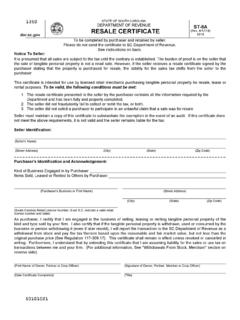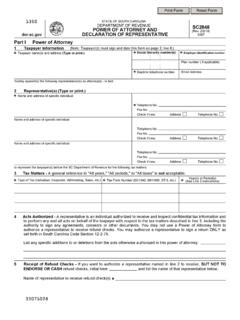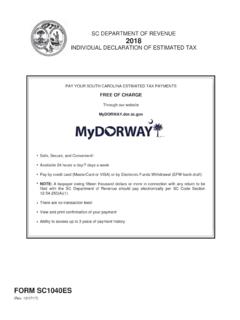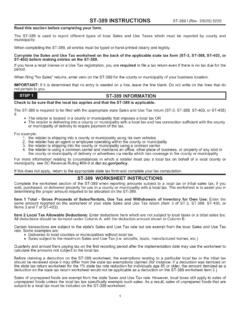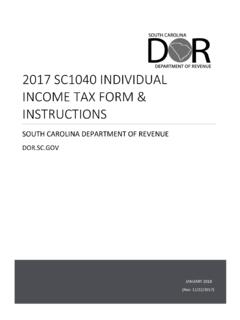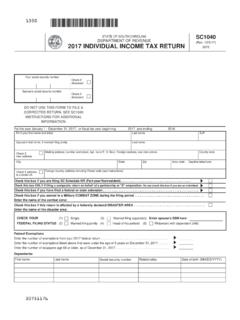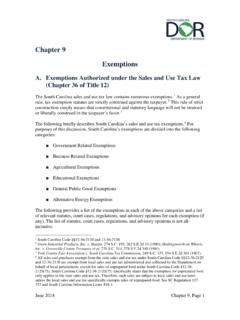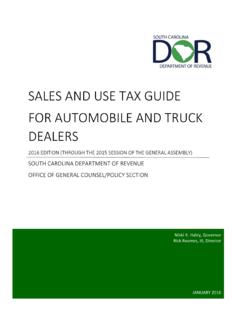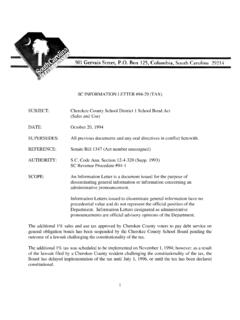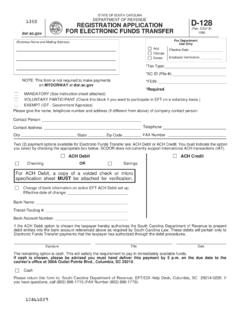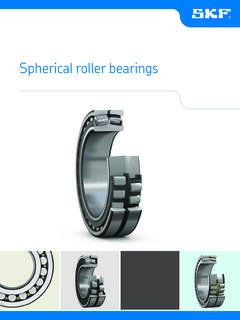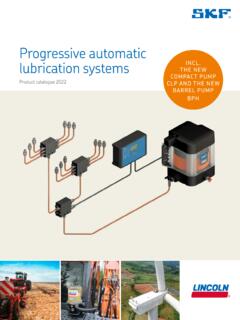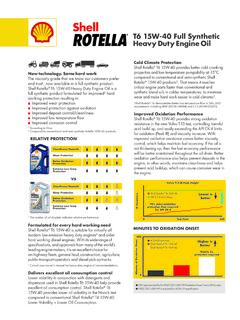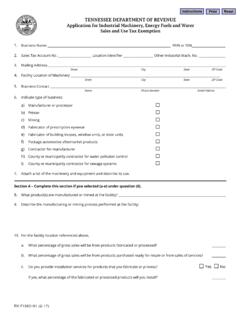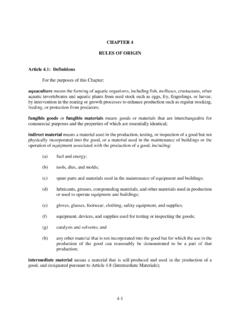Transcription of Manufacturers, Processors, and Compounders
1 April 2019 Chapter 14, Page 1 Chapter 14 Manufacturers, Processors, and Compounders A. General Information Manufacturers, processors, and Compounders are eligible for numerous exclusions and exemptions from sales and use This chapter provides a more detailed discussion of the most common exemptions available to manufacturers, processors, and Compounders , such as the sales tax exemption for machinery used in manufacturing, processing, compounding, mining, or quarrying tangible personal property for sale;2 ingredient parts;3 electricity;4 fuel;5 packaging;6 and sales for B. Machines, Parts, and Attachments General Information. The machine exemption 8 exempts from sales and use tax purchases of machines used in manufacturing, processing, agricultural packaging, compounding, mining, or quarrying tangible personal property for sale.
2 The term machines includes the parts of machines, attachments, and replacements used, or manufactured for use, on or in the operation of the machines and which are necessary to the operation of the machines and are customarily so used or are necessary to comply with the order of an agency of the United States or of South Carolina for the prevention or abatement of pollution of air, water, or noise that is caused or threatened by a machine used in manufacturing, processing, recycling, compounding, mining, or quarrying tangible personal property for sale. This exemption does not include automobiles or trucks. The applicability of this machine exemption depends on whether the machine is integral and necessary to the manufacturing process9 - , is the machine an essential and indispensable component part of the manufacturing process and is it used on an ongoing and continuous basis during the manufacturing process.
3 The court in Hercules 1 South Carolina Code 12-36-2120 and 12-36-120 and SC Regulation 117-302. 2 South Carolina Code 12-36-2120(17). 3 South Carolina Code 12-36-120(2). 4 South Carolina Code 12-36-2120(19). 5 South Carolina Code 12-36-2120(9). 6 South Carolina Code 12-36-2120(14) and 12-36-120(4). 7 South Carolina Code 12-36-120(1). 8 South Carolina Code 12-36-2120(17). 9 References to manufacturing include processing, compounding, mining, and quarrying. April 2019 Chapter 14, Page 2 Contractors and Engineers, Inc. v. South Carolina Tax Commission, 313 2d 300 (1984) set forth a test for determining if a machine is integral and necessary to the manufacturing process; two South Carolina court decisions in 2003 have followed and clarified this theory.
4 Each is briefly discussed below. Hercules Contractors and Engineers, Inc. v. South Carolina Tax Commission, 313 2d 300 (1984). Hercules involved whether a facility that treated waste on plant property that was produced in connection with the manufacture of textile products for sale was a machine. The Court held that the wastewater treatment facility was a machine and that its various parts and attachments (such as vats, basins, tanks, pumps, other mechanical devices, troughs, and pipes) are integral and necessary to the operation of the system as a whole. The following test was used by the Court in determining what is an exempt machine. Are improvements, either fastened or loose, 1.
5 Used directly in manufacturing the products that the establishment intended to produce; 2. Necessary and integral part of the manufacturing process; 3. Used for the purpose of manufacturing the product it was intended to produce; and 4. Not benefiting the land generally, and will not serve various users of the land. The Court further defined the term machine to include the concept of combination ( , combination of mechanical powers, parts, attachments and devices to perform some function and produce a certain effect or result integral and necessary to the manufacturing process) and held that the statute does not require a machine to have moving parts if it is an integral part of the manufacturing process and that the statute makes no distinction as to whether a machine is a fixture or personal property.
6 Springs Industries, Inc., v. South Carolina Department of Revenue, South Carolina Court of Appeals, No. 2003-UP-029, (1/8/03) (unpublished), cert. denied, (10/8/03). Springs involved the applicability of the machine exemption to machines used in manufacturing at a textile plant, and to chemicals used at the plant s wastewater treatment facilities to purify manufacturing waste. The court held that machinery is exempt if it is integral and necessary to the manufacturing process and used in an ongoing and continuous basis during the manufacturing process. April 2019 Chapter 14, Page 3 Anonymous Corporation v. South Carolina Department of Revenue (02-ALJ-17-0350-CC).
7 This case involved whether buildings or parts of buildings could be exempt under the machine exemption. The Administrative Law Court held that building materials, such as paint and sealants, foundations, structural steel, steel decking and checkers plates for buildings, hangers and supports for process piping, and architectural roofing and siding, purchased to construct a manufacturing facility were not exempt as a machine. The machine exemption does not apply to everything that can be useful to a manufacturer. The applicability of the machine exemption depends on whether the machine is integral and necessary to the manufacturing process. C. Machine Exemption General Rule A machine qualifies for the machine exemption if the machine meets the following three requirements:10 1.
8 The machine is used at a manufacturing facility whose purpose is manufacturing a product for sale. It does not apply to machines used at a facility whose purpose may be retailing, wholesaling, or distributing. For example, machines used by an industrial baker manufacturing breads for sale may be exempt; however, similar machines used by a local retail bakery are not exempt. 2. The machine is used in, and serves as an essential and indispensable component part of the manufacturing process, and is used on an ongoing and continuous basis during the manufacturing process. Note: A machine integral and necessary to the manufacturer, such as a machine used solely for warehouse, distribution, or administrative purposes, is not exempt under the machine exemption since it is not integral and necessary to the manufacturing process.
9 3. The machine must be substantially used (not necessarily exclusively used) in manufacturing tangible personal property for sale, , more than one-third of a machine s use is for manufacturing. A machine meeting the above requirements may be exempt even if it does not have moving parts or is a fixture upon the real estate where it stands. However, buildings and parts of buildings, as well as other improvements which benefit the land generally and may serve other users of the land, are not 10 SC Regulation 11 SC Regulation April 2019 Chapter 14, Page 4 D. Machines - Replacement Parts and Attachments Parts of machines, attachments, and replacements used, or manufactured for use, on or in the operation of exempt machines are also exempt under the machine exemption if they are (1) used on or in the operation of exempt machines, (2) manufactured for use on or in the operation of exempt machines, (3) integral and necessary to the operation of exempt machines, and (4) customarily so used.
10 In order to be exempt, a part or attachment must be purchased in the form in which it will be used by the manufacturer without any fabrication or alteration by the manufacturer, except the usual and customary minor adjustment. It must be a standard part or attachment customarily used and, further, that the machine or machinery on which it is used would not do the work for which it was designed if it were not used. This exempts all parts and attachments without which the machine would do no work, and exempts parts and attachments designed to increase the efficiency of the E. Examples of Exempt Machines or Machine Parts Examples of exempt machines or parts of machines include the following: material handling or mechanical conveyor machines feeding the first processing machine; the machine that discharges the finished product from the last machine used in the process.
